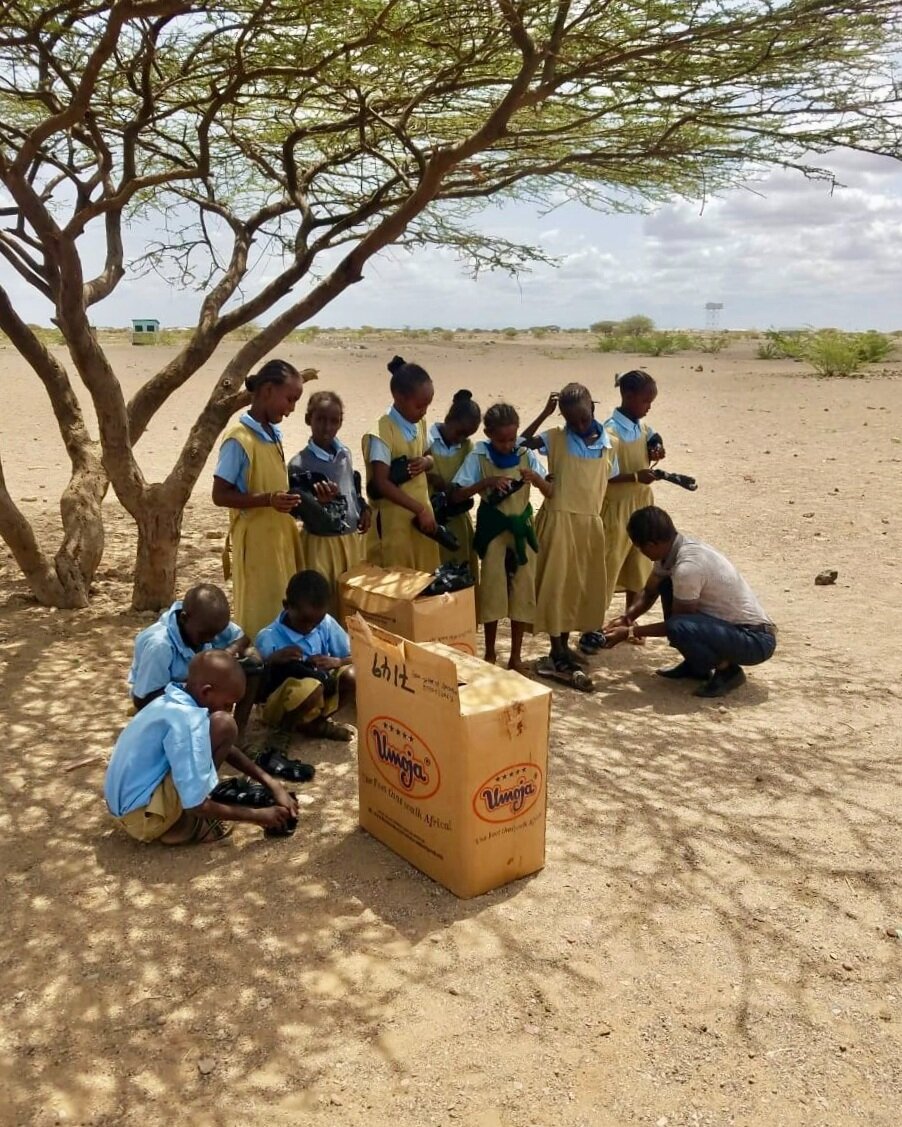Meeting immediate needs in Marsabit
Since Hemant Ramachandra has been working with remote communities in and around Marsabit, Kenya since 2015. These communities face many challenges, Hemant explains, “Marsabit is a forgotten area, with a lack of water and lack of infrastructure.”
Partnering with Marsabit
Hemant partners with a close friend, Pastor Hirbo Aftiyes, who lives in Marsabit, and with members of the community to implement long-term programs that improve quality of life for the kids and families in the community.
Pastor Hirbo (left) and Hemant (right) meet with community members in Marsabit.
Hemant stresses the importance of working collaboratively with the communities to create long-term solutions. When he visits, Hemant explains, “I meet with the community leaders, I meet with the women’s group … I listen to what their challenges are.” Before choosing any project, Pastor Hirbo and Hemant hear from various leadership groups in the communities to find a solution that everyone agrees on.
From these conversations, Hemant and Pastor Hirbo have led efforts to support education through school buildings and renovations, to increase literacy for women and children through hiring teachers, and to improve access to water through a monthly water drop off to a communal tank.
In 2019, Pastor Hirbo directed Hemant’s attention to the lack of footwear and the presence of soil-transmitted diseases and parasites. Many children were suffering from parasites, like jiggers, in their feet. Jiggers, also known as sand fleas, burrow into the skin, causing acute pain and inflammation at the site. “In places with little available medical care, the condition [the sand flea] causes—called tungiasis—leads to not only unbearable itching, but also secondary infections that make it hard to walk” (The Atlantic 2013).
Implenting anti-jigger practices in Marsabit
After learning of this, Hemant and Pastor Hirbo launched a foot-washing program, teaching kids about the proper technique to help with soil transmitted diseases and painful jiggers. The process requires a daily routine of soaking feet in a special formula.
Pastor Hirbo distributes The Shoe That Grows to Marsabit students in the spring of 2021.
The treatment helps kill the sand fleas, but it doesn’t prevent more from burrowing in exposed skin if the children still have to walk barefoot to school (a walk that takes up to an hour for some students) or to fetch water from the communal water tank.
Hemant started distributing shoes to protect the kids’ feet, but noticed they were quickly outgrowing shoes. “It’s not sustainable … A shoe can only last 3–5 months or so.” Hemant had to find a shoe that wouldn’t just protect the children’s feet today—he needed a long term solution.
That’s when Hemant discovered The Shoe That Grows, a shoe that expands five sizes and lasts for years. With a multi-layer rubber sole and durable straps along the side and top, the students would be able to protect their feet and adjust their shoes as they grow.
A student in Marsabit smiles, wearing her new pair of The Shoe That Grows.
Fundraising for the shoe that grows
In January of 2021, Hemant used his birthday to fundraise for 176 pairs of The Shoe That Grows for the children in Marsabit. Due to COVID-19 travel restrictions, Hemant shipped the pairs to Pastor Hirbo, who carried out the shoe distributions in cooperation with the local schools, incentivizing kids in school to earn pairs of The Shoe through their schoolwork.
“So far, Pastor Hirbo has told me that it’s gone really well, the kids love the shoes,” Hemant shares. They plan to fundraise for The Shoe That Grows again this fall to distribute more pairs to students in Marsabit.
Hemant envisions a program around water, food, clothing and healthcare that meets immediate needs so that the children in Marsabit have continued access to education and opportunities for empowerment. Because things are better when we work together.
To support more distributions like Hemant’s join The Sole and get shoes to children around the world with your monthly donation.



